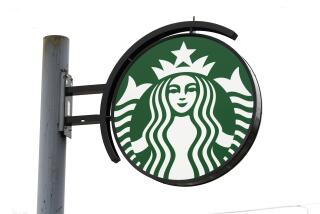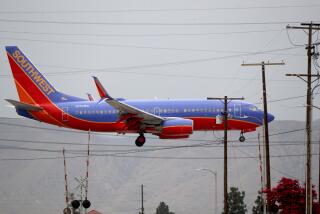Safeway Faces 400 Counts of Aiding Boycott of Israel
- Share via
WASHINGTON — The Commerce Department Friday charged Safeway Stores Inc. with more than 400 counts of complying with the Arab boycott against Israel, by far the biggest such case ever brought in the 10-year history of the U.S. anti-boycott law.
William V. Skidmore, director of the Commerce Department’s Office of Antiboycott Compliance, said that fines in the case could total $3.5 million if all charges are proved before an administrative judge and if maximum penalties are assessed. That amount would be more than 10 times the largest previous anti-boycott settlement.
Arab countries have boycotted Israeli goods for more than 30 years and have blacklisted companies that do business with Israel, directly or indirectly. Under a 1977 law, the United States forbids Americans to join that boycott or cooperate with it in any way.
In addition, the government forbids U.S. firms to divulge either to boycott offices in Arab countries or to other companies cooperating with the boycott any information about their own business dealings with Israel.
Safeway, which had $20.3 billion in sales last year, is the largest retail food operation in the United States. Late Friday, Safeway said through a spokesman that “the government’s charges are preposterous” and insisted that the company has “done everything possible to comply with the U.S. anti-boycott law.”
Felicia del Campo, Safeway’s public affairs manager, said that the Oakland, Calif.-based company’s only overseas operations involve agreements to provide technical assistance and management expertise to Arab-owned service companies in Saudi Arabia, Kuwait and the United Arab Emirates, where five retail stores are licensed to use the Safeway name and logo.
The Commerce Department charges are limited to the Safeway operation in Saudi Arabia, where the company licensed two stores through Tamimi & Fouad Foods Ltd., a locally owned firm, and in Kuwait, where one licensed Safeway outlet was run by Americana International-Safeway, also locally owned.
330 Serious Counts
The 445 counts listed Friday in a “charging letter,” which places the issue before a Commerce Department administrative judge, include about 330 more serious counts that Skidmore said could theoretically result in fines of as much as $10,000 each.
Of these, 141 were cases in which Safeway executives, in their arrangements with Tamimi & Fouad in Saudi Arabia and Americana International-Safeway in Kuwait, were alleged to have refused to do business with companies on the anti-Israel blacklist.
In 173 other instances, Safeway managers are alleged to have instructed other customers or suppliers not to do business with Israel directly or with blacklisted companies.
Accused of Supplying Data
In addition, the Antiboycott Office charged Safeway with furnishing information about the company’s dealings with Israelis or with blacklisted companies to the Israel Boycott Office of Kuwait and with 24 instances of furnishing information about company officers’ or other persons’ affiliations with groups that support Israel.
Finally, the U.S. anti-boycott office said that Safeway failed to inform it “in a timely manner” of 13 instances in which the company was ordered by boycott enforcers in the region to limit dealings with Israel or with blacklisted companies.
Before this case, the largest anti-boycott penalty was a $323,000 fine imposed about three years ago against Citicorp. That penalty, Skidmore said, was not reached through an administrative procedure, such as the one initiated Friday, but rather through a negotiated agreement, as are about 95% of all complaints brought by the anti-boycott office.
Could Take Years
Skidmore said that negotiations with Safeway broke down after about six months. The case before the administrative judge could take many months, if not years, to resolve.
Under the procedure initiated Friday, an administrative judge at the Commerce Department will set a deadline for Safeway to reply to the complaint and then schedule a hearing. That judge has the power to decide the validity of the charges and to impose fines. His decision could be appealed to Paul Freedenberg, assistant secretary of commerce for international trade.
After all Commerce Department procedures are exhausted, the issue could go to the federal court system.
More to Read
Inside the business of entertainment
The Wide Shot brings you news, analysis and insights on everything from streaming wars to production — and what it all means for the future.
You may occasionally receive promotional content from the Los Angeles Times.










